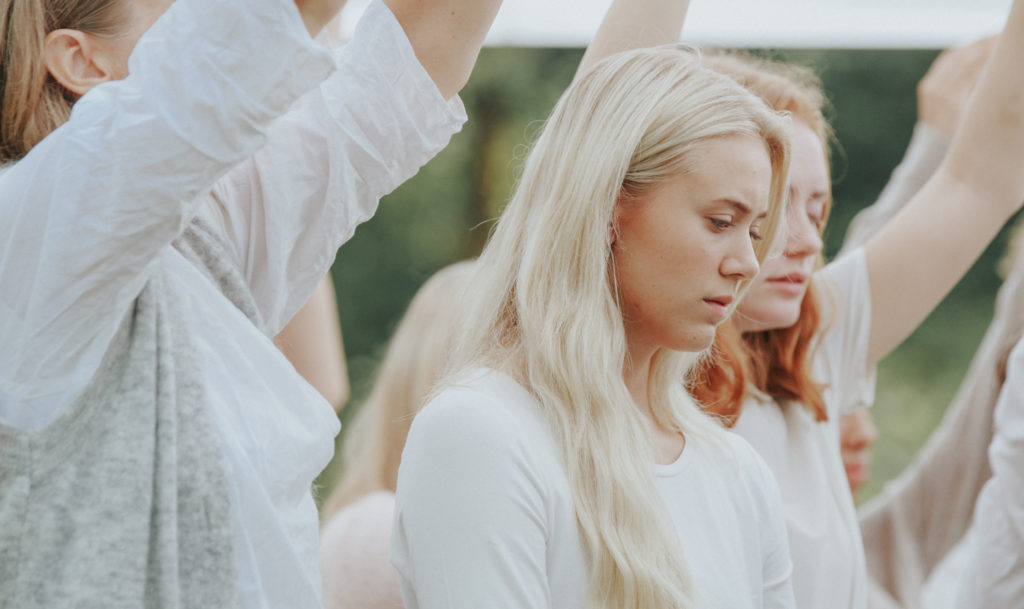Jorunn Myklebust Syversen works across film, video-art, and photography. Her first feature was 2017’s “The Tree Feller.” Since 2005, her work has been shown at several international festivals, screenings, and exhibitions.
“Disco” premiered at the 2019 Toronto International Film Festival on September 7.
W&H: Describe the film for us in your own words.
JS: On the surface, 19-year-old Mirjam’s (Josefine Frida Pettersen) life appears perfect. She is a world champion freestyle disco dancer, and the youth leader of the church, Freedom, where her stepfather is the charismatic pastor.
Under the surface, Mirjam struggles with displaced memories from her childhood. Her body starts to fail her, and during the World Championship she collapses. She starts confronting her mother about her family background to find answers as to why her body and mind are shutting down.
Her family is incapable of giving her the direction and support she needs. They only tell her to believe stronger and better. She continues looking to God for answers and finds a more conservative church to turn to.
In the hope of being saved she runs away from home to attend her new church’s summer camp.
W&H: What drew you to this story?
JS: I am interested in isolated environments and power dynamics in close relationships and groups. I believe that the fear of the meaningless is a human tendency and that a need to convince others of our own truth comes from this fear.
I believe that our fear of meaninglessness leads certain groups to tell others how they should live their lives. This can quickly evolve into a way of limiting each other. I wanted to question how religious environments find people in their most vulnerable stages of life, especially children.
I also wanted to look into the power structures within the Evangelical church because I think we need to realize that social control, power imbalances, and mental and physical abuse aren’t just a question of being from another culture or minority.
You’ll find it in Christian environments and you’ll find it everywhere — not only restricted to homes with minority backgrounds or lower social classes.
I also wanted to question how the belief in, and donations to your congregation, are intertwined.
W&H: What do you want people to think about when they are leaving the theater?
JS: I want to talk about the imbalance of power within relationships and religious environments. I want the audience to understand how Mirjam came to lose control of her own life.
This can happen to anyone during a vulnerable time in life. I want the audience to understand, on an emotional level, how easy it is to get drawn into destructive relationships that lead to a loss of self.
W&H: What was the biggest challenge in making the film?
JS: I think ambition must be the biggest challenge and the biggest opportunity in the making of any film. It can be a struggle to be part of a small team, but for me it’s also what has been the ultimate opportunity for me to develop as a director.
Building trust and connections with your team as a whole has been my main focus in art and filmmaking. It’s easier to create an intimate and relaxed workspace with a small crew.
Having a team where everybody really wants to be part of the project means so much to be able to achieve the authenticity of the film.
W&H: How did you get your film funded? Share some insights into how you got the film made.
JS: Through the New Paths program, an initiative from the Norwegian Film Institute, which supports projects aimed at developing new ways of filmmaking and the talent’s artistic skills.
It has been essential for my professional and artistic development. I’m so grateful for receiving the trust from the institute and to have this opportunity.
W&H: What inspired you to become a filmmaker?
JS: As a video artist I’ve always been dazzled by the power of cinema. After ten years working between experimental film and video art I started to realize that my strongest connection was with feature films.
I think it’s the most powerful and interesting medium, where you can work on so many layers within a story together with all the audiovisual tools.
W&H: What’s the worst advice you’ve received?
JS: “So, you’re a contemporary artist? You’re one of those who draws a line on a wall and calls it art? You should get an ordinary job. Why don’t you be a TV presenter?”
W&H: What advice do you have for other female directors?
JS: Find the core of what you want to say and stick with it, but work to develop a strong communication with the people you work with and your audience. Accept your vulnerability and use it as a force.
W&H: Name your favorite woman-directed movie and why.
JS: “Toni Erdmann” by Maren Ade. I seldom like to watch films twice, but this film I saw three times in a row.
The script is brilliant and the dynamics between the dialogue and the actors is so authentic, humoristic, clever, raw, and at the same time really vulnerable. I love it. It’s one of my top three movies.
W&H: What differences have you noticed in the industry since the #MeToo and #TimesUp movements launched?
JS: Discussions regarding gender equality in the Norwegian funding system had been taking place ahead of #MeToo, largely because of a group of artistically groundbreaking female directors in Norway who spoke out.
But when the movements started, I think it helped everyone to be more aware of gender equality in terms of how we discriminate against women in our language and culture as well as concrete suggestions on how to empower and support women in film.







